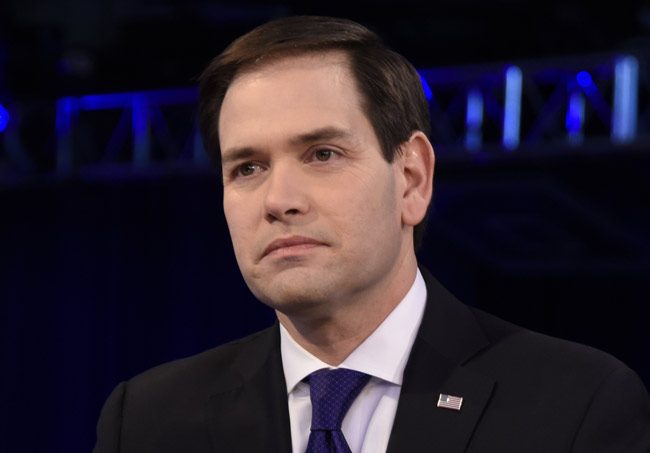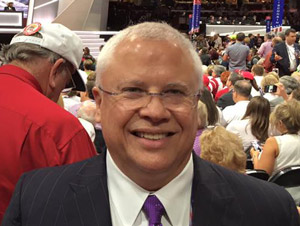
A year ago, this — “this” being a too-warm, newly opened Republican Party office in a strip mall in Panama City — is not where U.S. Sen. Marco Rubio expected to be.
Back then, Rubio was still experiencing largely favorable coverage of his chances of winning the Republican presidential nomination. He had confidently ruled out running for re-election to the Senate, where partisan gridlock frustrated him.
But here he was this month after all, a few doors down from Emerald Coast Eye Care, signs for his recently minted re-election bid plastered all over the walls of the Republican Party of Florida’s “Victory” office. Rubio gave a brief pep talk to supporters before lingering to shake hands, pose for pictures and autograph still more signs.
“I ran for president, and I wanted to win,” Rubio told a reporter a few minutes later in a cooler back room. “It didn’t work out. I quite frankly wasn’t going to run. I was going to take some time and do some different things.”
But Rubio is running again for a Senate seat that he was ready to vacate, a seat some critics say he had already vacated, a seat that at times seems almost as much like a form of captivity for Rubio as it does a prize. Even when he reconsidered, it was prompted in part by party leaders who virtually begged the incumbent to get back in the race to keep it from falling to the Democrats.
Already, Rubio looks to be focusing on that autumn challenge, a potentially competitive general election that might decide whether the GOP holds onto its Senate majority. In the meantime, he faces a primary against largely outmatched opponents, the most prominent being wealthy home builder Carlos Beruff. And while the senator and his team clearly feel good about their chances of winning the nomination — well, if there’s anyone who understands the perils of underestimating an outspoken, independently wealthy candidate from outside the political ranks, it’s Rubio.
“I’m not the owner of the Senate seat,” Rubio said. “I have to go out and earn it every six years if I want to seek re-election, and they have every right to run and be a part of the process.”
In some ways, Rubio and Beruff are mirror images of each other.
Both were born in Miami to Cuban immigrants of modest means. Both have done well in America.
Then, the break. Rubio, 45, is prepared, smooth-spoken and polished, a man who looked robotically programmed in a presidential debate. Beruff, 58, is brash, less given to five-point answers than Rubio but also less likely to come off as someone who’s just mouthing the talking points — or someone who has any talking points at all.
That has drawn comparisons to Republican presidential nominee Donald Trump, the man perhaps most responsible for Rubio’s changed re-election plans. Beruff doesn’t entirely reject the idea.
“It didn’t work out. I quite frankly wasn’t going to run.”
“English literature is not one of my strengths. Math is,” Beruff said. “I speak right to the point 99 percent of the time.”
In Beruff’s telling, he’s up against a man who is simply setting himself up for another presidential run in 2020 should Trump fail to win the White House. The theory, which is hardly confined to Beruff, is that if Rubio were working for a law firm in Miami or carrying on in some other job, it might be harder to keep up his profile.
“I’ve told hundreds of people, I’ve said: ‘Look, if you think Marco Rubio is going to Washington and in his heart he’s there to serve you as a public servant for the next six years — hell, vote for the guy.’ But the reality is, everybody knows he’s going to Washington for his own political future, because he doesn’t have a future anywhere else,” Beruff said.
Critics bore in on Rubio’s missed votes — 53 percent, by Beruff’s count — while he was running for the White House, and Rubio’s occasional grumbling on the presidential campaign trail about the state of the chamber that likes to consider itself the world’s greatest deliberative body.
“How dumb can we be to vote for a guy that says he doesn’t like his job and he doesn’t want to do the job and we’re going to keep on paying him a salary?” said Ernie Rivera, 58, a longshot candidate who has sunk about $500,000 of his own money into the race, according to his campaign.
Dwight Mark Anthony Young, of Clearwater, is also in the race. Federal Election Commission records do not reflect any contributions to Young. In a recent Suffolk University poll of voters who said they were likely to vote in the Aug. 30 primary, Young drew 1 percent of the vote and Rivera got no support.
Rubio brushes off the criticism of missed votes, listing presidential candidates going back to John F. Kennedy who have missed time in the Senate to stump for the presidency.
“But I can tell you we never stopped working,” Rubio said. “Even on the campaign trail, our office was continuing to get involved on the issues to help Floridians, and there were numerous occasions when a major issue came up, or an issue our vote would make a difference on, where we stopped campaigning and went back to D.C.”

If he gets re-elected, Rubio said he’ll continue to focus on national security issues like terrorism and the strength of the military, weigh in on nominations to the U.S. Supreme Court and continue to help Floridians who run into problems with the federal government.
For all his criticism about Rubio being in the race to keep political prospects intact, there is a sense of inertia to Beruff’s campaign as well. He’s amused by fellow businessman Todd Wilcox’s decision to abandon the race; the implied contrast is that Beruff is toughing it out, despite being an overwhelming underdog. The Suffolk poll showed him down 50 points, 62-12; some earlier surveys were less kind than that.
“At the end of the day, I knew that I had committed so many dollars to this race the day I made the decision to get in, and I do believe that there’s a certain amount of people that are fed up with sending people to Washington that say one thing and do another, and really don’t have the skill set,” Beruff said while discussing how the race changed when Rubio announced.
Campaign-finance reports, which currently list activity through June, say Beruff had already plowed $4.2 million of his own money into the race. In August, Beruff spoke of his total investment being somewhere around $8 million or $9 million.
Beruff touts a plan to scrap the Affordable Care Act and much of the policy that preceded it, building a new system from scratch that would be designed by experts. It would be beta tested for a short period of time, then replace the current framework for health care — and, Beruff is confident, save the taxpayers hundreds of billions of dollars in the process.
If there is a tangible criticism of Beruff, it’s that he gave money to former Gov. Charlie Crist’s 2010 U.S. Senate bid. Crist would later leave the Republican Party and run against Rubio as an independent, losing a three-way race.
Beruff has said he didn’t support Crist after the governor left the GOP; PolitiFact rated “mostly true” an ad from a super PAC that argued that he did — though without evidence of a direct endorsement. Beruff told a reporter the claim about him supporting Crist is “b.s.”
In the end, it might not matter that much. Beruff would have to make huge gains to overtake Rubio and deliver a final humiliation to a man who once seemed a few good months away from the presidency. Then, if Rubio can defeat the Democratic nominee — either Congressman Patrick Murphy or Congressman Alan Grayson, in all likelihood — the speculation will begin about whether he might change course again.
Standing in a back room in Panama City, instead of on a stage in Iowa or Ohio, Rubio didn’t directly answer a question about what might be in his future plans.
“I’m running to serve for the next six years in the U.S. Senate,” he says. “I want to make our mark there. No one knows what the future holds for anyone. But my plan is to hopefully go down as one of the best senators Florida’s ever had, and I know there’s more work to be done.”
–Brandon Larrabee, News Service of Florida





























Knightwatch says
Rubio’s running for his seat because it’s the only job he can get. He has never worked for a living, never had to the daily stresses working Americans have to deal with. He “works” as little as possible while he spends our tax dollars on his salary and expenses while he runs for president. And he’s done nothing at all for Florida… nothing!
If we relect Rubio, it will me more of the same. Money for nothing! We need to dump this do-nothing public parasite.
Flagler4Trump says
Apparently, Marco Rubio isn’t familiar with campaign finance laws. What he outlines in the following quote is illegal. His presidential campaign team and his Senate office staff cannot overlap.
“But I can tell you we never stopped working,” Rubio said. “Even on the campaign trail, our office was continuing to get involved on the issues to help Floridians, and there were numerous occasions when a major issue came up, or an issue our vote would make a difference on, where we stopped campaigning and went back to D.C.”
r&r says
He withdrew and when he realized he would have to get a real job that doesn’t allow him to report for work 20% of the time. He blew it and reflects his real self.
daveT says
I wonder if Rubio wins re-election if he will actually vote on something. In 2015 he held the #1 position on missed vote for all the senators. . https://www.govtrack.us/congress/members/marco_rubio/412491/report-card/2015
MR G. says
YOUR DONE RUBIO VOTE BERUFF …….!!!
MR G. says
whats that
Bc. says
He had is 15 minutes time for him to get a job vote Carlos B.